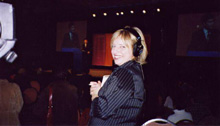Journalism Department teaches traits for success

CBC Montreal’s Amanda Pfeffer
While some students are memorizing Shakespearean sonnets or learning the periodic table, students at Concordia’s journalism department are trying to learn the importance of character traits like tenacity and curiosity.
According to many professionals, a large part of being a successful journalist comes from having the drive and determination to chase down stories and withstand criticism and rejection.
“A lot of it is attitude,” said Mike Gasher, who is acting chair and graduate program director of the Journalism Department.
“The kind of teaching we do is different. It’s not just about being open-minded to ideas, because most people are. We’re trying to teach students that the fundamentals are important: accuracy, reliability.”
The department tries to teach the value of these traits by giving students as much practical experience as possible by sending students out in the field to cover real stories.
“It’s learning by really doing: no pretending, no mock assignments,” Gasher said.
CBC television reporter and journalism grad Amanda Pfeffer said that one of the most important lessons she was taught at Concordia was to never take no for an answer. It was something she learned the hard way.
“I learned that because they didn’t let me in,” she said, laughing. “ I went to see [then-department director] Lindsay Crysler and I begged. I said, ‘I know what I’mdoing and I know what I want to do,’ and Lindsay let me in.” doing and I know what I want to do,’ and Lindsay let me in.”
Pfeffer said that it was the tenacity that she showed in that meeting that proved she would make a good journalist. Her refusal to give up also served her well once she became a professional.
When she left Concordia, Pfeffer started at the CBC in an entry-level position. Her boss at the time told her that she should give up her dreams of being a reporter because there were no jobs available. But Pfeffer refused to take her boss’s advice. “One year later, I was a reporter,” she said.
“A lot of people will tell you that there are no jobs right now — you shouldn’t be a reporter, you’re not good enough. You have to ignore it. You have to let it make you angry,” she advised.
In his role as program director and professor, Gasher teaches his students to resist the idea that there aren’t any jobs available.
“I don’t think it’s true,” he said. “There may not be any full-time permanent jobs hanging on trees but there are opportunities which lead to jobs all over the place. I’ve seen too many of our grads walk out of here and find opportunities with the biggest news organizations to buy into that.”
CFCF-TV legal affairs reporter Stéphane Giroux said he learned many important things at Concordia like the value of ethical behaviour during his studies. However, he also added that some of the most important traits for journalists are things that can’t be conveyed in a classroom.
“News judgment is very important. Either you have it or you don’t. You can’t teach that. Also, a natural curiosity to read newspapers, to watch newscasts. If you don’t have that, you fail.”
Gasher believes this is only partly true. While most things in journalism can be taught, some students “get it” more readily than others.
Learning in the classroom and taking part in internships gives students the chance to cultivate the right attitudes to be successful journalists. Gasher acknowledged that there will always be more that students can learn when they become professionals, but he believes that the teaching methods at Concordia give students a firm foundation for success.
“Every student who leaves here is still a work in progress. Experience is how we practice.”
Catherine Cullen is in the Graduate Diploma in Journalism program.